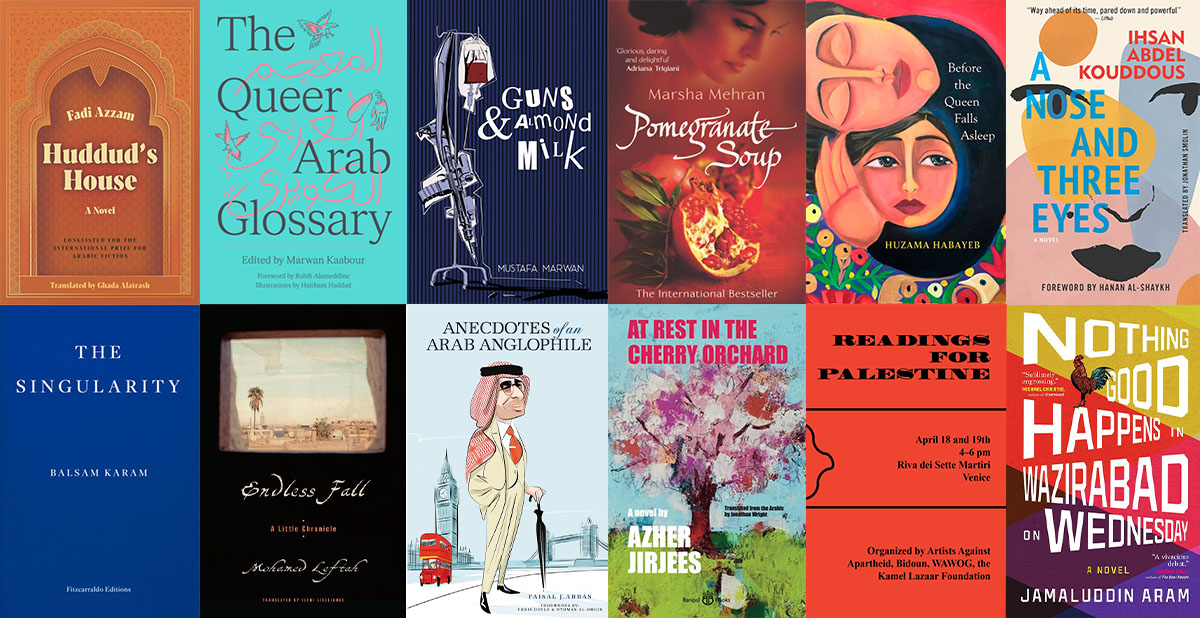Travel through the center of the world (the Middle East and North Africa) this summer from the comfort of your couch when you pick up any of these wonderful books. Our Literary Editor, Malu Halasa and PR and Production Manager, Sarah Naili have their book favorites here as well.
Drop us a line and let us know what books you’re reading this season. We’d love to hear from you! Email rana@themarkaz.org.
Rana Asfour
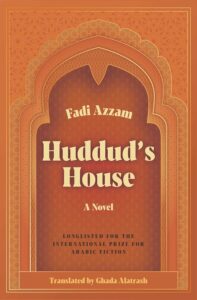
Huddud’s House by Fadi Azzam, translated by Ghada Alatrash, Interlink Publishing, 2024
Longlisted for the International Prize for Arabic Fiction (IPAF) in 2018, Huddud’s House by Fadi Azzam is a heartwrenching tale of forbidden love in times of war based in Damascus. When a doctor returns from London to sell the family home just before the Syrian Revolution of 2011, he discovers secrets that derail his plans.
Although the accounts in the novel unfold through fictional characters, what readers end up with is an oral history-like effect, rendering the story a poignant and highly emotional reading experience that examines not only the horrendous events that took place during the Syrian civil war but also the insanity and depravity that take hold during times of conflict in which exploitation and injustice impel people toward impossible decisions.
Author of the 2012 novel Sarmada, also longlisted for the IPAF in 2012, Syrian-born Fadi Azzam is living in exile in London. His latest book has been likened to the works of García Márquez and dubbed a “landmark work of contemporary Arabic literature.” Azzam was the culture and arts correspondent for Al-Quds Al-Arabi newspaper and his opinion columns have appeared in the New York Times and in newspapers across the Middle East.
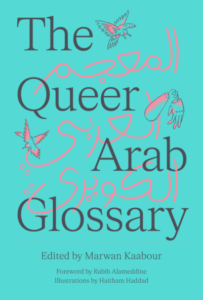
The Queer Arab Glossary, Edited by Marwan Kaabour, Saqi Books June 2024
In 2019 Marwan Kaabour set up the Instagram account Takweer where he continues to collect, archive, and research queer narratives in Arab history and pop culture. The account has over 22,000 followers and inspired this first published bilingual collection of Arabic LGBTQ+ slang glossary.
With a foreword by Rabih Alameddine and 30 captivating illustrations by Haitham Haddad, this one has made it onto every book list since its UK release last month. (The US edition is expected in September 2024).
Containing more than 300 words, statements, and phrases used in the past and the present to refer to the LGBTQ+ community across the Arabic-speaking world, leading queer Arab artists, academics, activists, and writers offer insightful essays ranging from the humorous to the harrowing, from the serious to tongue-in-cheek, and the derogatory to the endearing that appear in defiance of existing models of expression, and come imbued with hope for reshaping the narrative.
Contributors include Saqer Almarri, Nisrine Chaer, Sophie Chamas, Rana Issa, Adam HajYahia, Suneela Mubayi, Mejdulene Bernard Shomali, Hamed Sinno and Abdellah Taïa.
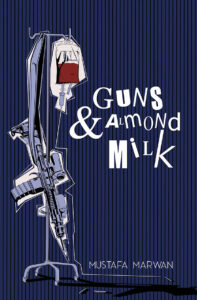
Guns and Almond Milk, by Mustafa Marwan, Interlink Publishing 2024
If you’re into fast-paced, contemporary thrillers mixed in with dark humor, this debut medical thriller is a definite choice to read on any vacation.
Set between the UK and Yemen (where the author has lived and worked), British Muslim war surgeon, Luke Archer, is taken hostage in a besieged hospital in Yemen where “dying from friendly fire is much more likely than enemy fire.” When he’s caught in the crossfire between rebel forces and ruthless security contractors, Luke realizes that to save himself, he’ll need to own up to the demons of his past.
It’s a story of love, stolen artifacts, proxy wars, obsessions, desires, allegiances, and the absurdity of our times that offers a perspective on humanitarian work, religion, assimilation, and Middle East politics and one whose images will lodge deep in the mind well after the reading has ended.
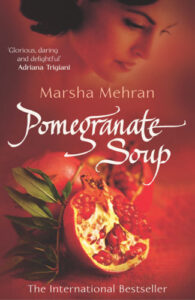
Pomegranate Soup by Marsha Mehran, Penguin 2006
This oldie-but-goldie novel continues to be one of my favorite reads and one that I recommend often. Think Chocolat by Joanne Harris.
Set in Ireland where three sisters fleeing Iran hope that a land of “crazed sheep and dizzying roads” might finally be the place they can call home, it is infused with the textures and scents, trials and triumphs of two distinct cultures. Pomegranate Soup is an infectious novel of magical realism.
TMR’s PR and Production Manager, Sarah Naili, had this to say after completing the book she finds perfect for summer:
“I loved this culinary novel, which took me on a journey to the heart of Persian culture through the adventures of three sisters in exile in Ireland, where they opened the Babylon café. The story is about sisterhood, exile, the resilience of women in the face of brutality and the patriarchy. Above all it is about cooking and its poetic power. The story is embellished with real recipes from typical Iranian cuisine that you should try this summer.”
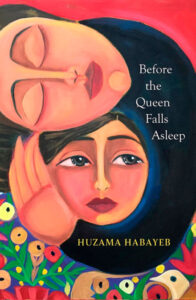
Before the Queen Falls Asleep by Huzama Habayeb, translated by Kay Heikkinen, MacLehose Press 2024.
Award-winning Palestinian author Huzama Habayeb’s second novel in English centers around a Palestinian family forced to leave Palestine. Since they “had to live,” they moved to Kuwait, Jordan, and later to Dubai. When the Gulf war shatters their fragile security, the protagonist Jihad’s family, like many Palestinians arrive in Jordan to live “in a room used triply as a living room, a room to receive guests, and a bedroom.”
Although Jihad is a girl, she is born to parents who expected a boy. She is given a boy’s name and grows up treated like the eldest son, wearing boy’s clothing and sharing the financial burden of the head of the household with her father. As Jihad’s daughter, Maleka, prepares to leave home to attend university abroad, Jihad talks to her daughter about her family’s life in exile and her own experiences of love and loss.
The author’s first novel Velvet, which Heikkinen also translated, won the 2017 Naguib Mahfouz Medal for Literature and the 2020 Saif Ghobash Banipal Prize for Arabic Literary Translation.
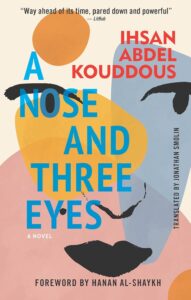
A Nose and Three Eyes by Ihsan Abdel Kouddous, translated by Jonathan Smolin, Hoopoe 2024
Feisty sixteen-year-old Amina is engaged. She is a woman who does what she wants and rarely heeds what others think about her. Despite her engagement, she is involved with another man. A Nose and Three Eyes is Amina’s story about her love affair with womanizer Dr. Hashim, her sexual awakening, and what she really thinks about love. Cairo is a town full of secrets and the novel rollicks and delights in uncovering the shenanigans going on behind closed doors.
Set in 1950s Cairo, this novel by iconic Egyptian writer Ihsan Abdel Kouddous smashed through taboos when it was first published in Egypt in the 1960s due to themes centered on female desire and sexual awakening, love and infatuation, critiquing the expectations society placed on women particularly during the Nasser regime. Kouddous’ books continue to be wildly popular, to the chagrin of many moralists, and today more than ever his books are seminal in ushering in an era of modern mass entertainment. The novel is reimagined on the silver screen for a 2024 audience, featuring a stellar cast of Egyptian actors and celebrities. The original 1972 film can be viewed here, and the 2024 can be streamed here.
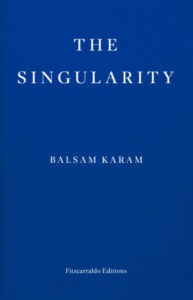
The Singularity by Balsam Karam, translated by Saskia Vogel, Fitzcarraldo Editions 2024
The Singularity, the second novel (and first to be published in English) by Swedish author of Iranian-Kurdish descent Balsam Karam, is set in an unnamed coastal town, home to many refugees where a mother of a displaced family searches for her child. “Nothing in her face recalls what once was, and if someone shouts her name, she doesn’t turn around and say no or stop it in the language no one here understands or wants anything to do with; if they stop, she doesn’t meet their gaze, and if they say, wait, she doesn’t come back with a why nor later I have just as much right to walk here as you do, why can’t you understand that?” Devoid of hope and frantic with grief, she throws herself into the sea, leaving her other children behind. Bearing witness to this suicide is another woman — on a business trip from a distant country, with a swollen belly that later gives birth to a stillborn baby. In the wake of her pain, the second woman remembers her own litany of losses — of a language, a country, an identity — when once her family fled a distant war.
Weaving between both narratives and written in looping prose rich with meaning, The Singularity is an astounding study of grief, displacement, and motherhood in a place both beautiful and brutal.
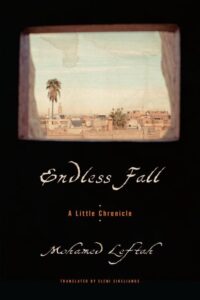
Endless Fall: a little chronicle, by Mohamed Leftah, translated by Eleni Sikelianos, Other Press 2024
In Settat in the 1960s, when it was still a tiny village, a young man leapt to his death in front of his stunned class and their teacher, who was left holding a brief, devastating suicide note. Among the students is Moroccan journalist, literary critic and author Mohamed Leftah. Haunted by the uncommon grace of that desperate act and the tragic image of his body lying in the courtyard, Leftah penned this chronicle of life at the time, marked by repressed desire and shame.
“No more than a quarter of an hour had passed between the moment when I climbed the staircase with him to reach the fourth-floor classroom where Mr. Ciccion had already started his history class—we were both late—and the moment when he became this sleeper in the bloodied courtyard; a smiling sleeper in the valley.
Motionless . . .
More than forty years later, I still see all the stages, the unstoppable sequences of this transmutation, unfurling so clearly before my eyes.”
A lyrical meditation on taboo acts — homosexuality, adultery, suicide — and the hypocrisy and cruelty often found in those who judge them, Endless Fall also offers a fascinating window into the mind of the seminal writer that shuttles between the past and the present.

Anecdotes of an Arab Angliophile by Faisal J. Abbas, Nomad Publishing 2024
Faisal J. Abbas is the editor-in-chief of the Middle East’s daily English language, Arab News, and is Chair of the Saudi Journalists’ Association.
In his debut, Abbas shares a witty and urbane insight into what it is like being an Arab in London where he landed to start work in 2004. “Prior to being an Anglophile, I was a major Anglophobe. But it was not a phobia based on hate, as much as it was based on ignorance… before I knew it, the plane was touching down at Heathrow airport. My heart began beating fast. I had finally arrived at the gates of the chocolate factory!” he writes in the opening chapter headed Charlie and the Chocolate Factory.
With entertaining chapters titled after well-known British books, Faisal pens anecdotes that cover sex, politics, and even religion. The book’s greatest strength is its abundant wit and humor in which he uncovers his journey from Anglophobe to Anglophile by managing Great Expectations, avoiding “Les Misérables,” but never losing sight of that Alice in Wonderland voyage of discovery.
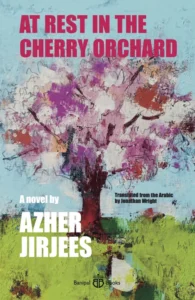
At Rest in the Cherry Orchard by Azher Jirjees, translated by Jonathan Wright, Banipal Books 2024
Described by one critic as a “hymn to Baghdad,” the novel tells the story of Said Mahdan, who flees Iraq after an informer colleague reports him for a joke about Saddam Hussein. He obtains asylum in Norway, learns the language, marries his Norwegian language teacher, adopts her family name Jensen, and starts writing satirical stories in Norwegian for the Dagposten newspaper. However, his life is haunted by visitations from the ghost of his father, who demands to know where his grave is after he was seized and killed by the former regime.
When Said’s wife dies, he suffers from a deep depression alleviated only by the ketamines the doctor prescribes. He is urged by his e-friend Abir to come immediately back to Baghdad, where a mass grave that probably contains his father’s remains is about to be opened. He goes back at short notice, only to find that Baghdad after the US invasion of 2003 is not the paradise he has been promised, and instead a place where he falls prey to dark, violent encounters.
Jirjees writes probingly about the exhausted city, the poisonous religious militias, and the possibility of ever finding peace, even if it were in the shade of a simple cherry orchard.
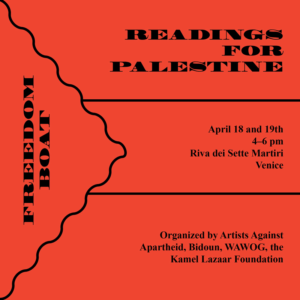
Gaza Reader, Vol. 1, published by Bidoun, Artists Against Apartheid, Bidoun, WAWOG (Writers Against the War on Gaza) and the Kamel Lazaar Foundation, 2024
TMR’s Literary Editor, Malu Halasa had this to say about her choice read this summer:
There can be no better introduction to Palestinian poetry than Gaza Reader, Vol. 1, a low-fi booklet published on the occasion of the Freedom Boat, at the 2024 Venice Biennial. Ever present is the ongoing assault on Gaza and the occupation of Palestinians bodies, hearts and minds by the Israelis. However, deeply embedded in poetry, spoken word, and experimental writing is what the Israelis will never control like humor and family culture.
Gaza Reader opens with Mohammed El-Kurd’s poem, “Portrait of My Nose,” a paean to his grandmother Rifqa, “she was never a / nose away from anything / but jasmines.” Or wonder at survival, in Maya Abu al-Hayat’s “I Don’t Ask Anymore”: “your name, your age / what you look like don’t matter. / You passed through here / like a miracle.” Or searing moral outrage.
Hala Alyan’s poem “The Interviewer Wants to Know about Fashion” is a part response to former Knesset minister Ayelet Shaked who predicted last November that Khan Younis will be turned into a soccer field “with the assistance of God and the IDF” — obscene words as the Israelis attack Khan Younis as I write this.
There’s also self-knowledge in lines by Noor Hindi: “I know I’m American because when I walk into a room something dies.”
The Gaza Reader’s 27 contributors include, among others, Mosab Abu Toha, Fady Joudah, Naomi Shihab Nye, Samer Abu Hawwash, and the late Refaat Alareer and Walid Daqqa. Artwork by Hazem Harb, Taysir Batniji, and Aml el Nakhala illustrate this first volume.
Voices from history provide valuable hindsight. Alongside Mahmoud Darwish is Ghassan Kanafani’s 1956 “Letter from Gaza” to a friend who’s left Palestine to study in Sacramento, California. Kanafani too has his documents in place; all he needs to do is depart for the promise of a better life — one that won’t end in assassination in Beirut by the Israelis in 1972. With no regrets, Kanafani writes, “I won’t come to you. But you, return to us! Come back, to learn from Nadia’s leg, amputated from the top of the thigh, what life is and what existence is worth.”
June jordan wrote the poem, “Apologies to All the People in Lebanon” after the 1982 Israeli invasion of Lebanon and the Sabra and Shatila massacre. Her lines resonate: “They said something about never again and then / they made close to one million human beings homeless / in less than three weeks and they killed or maimed / 40,000 of your men and your women and your children. / … / They said they were victims. They said you were Arabs.”
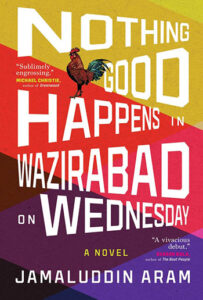
Nothing Good Happens in Wazirabad on Wednesday, a novel by Jamaluddin Aram, Simon & Schuster 2023
This novel set in Afghanistan in the 1990s is actually a series of short interconnected stories that pack a punch, written with humor and sometimes even a bit of magic realism (watch for the rooster character featured on the book’s cover). Esteemed Afghan American author Tamim Ansary enthused, “This book is a masterpiece, and I do not say those words lightly. Opening Aram’s novel is like waking into a lucid dream. Here, fable and nightmare fuse into a single flavor. Everything feels strange and yet so preternaturally real, and the strangest thing of all is how normal it all comes to feel . . . Some books demand admiration for the intensity of the writer’s imagination, some for the depth of detail, some for the poetry of the language, some for the authority of the writer’s voice — rarely do we see all these powers operating in consort as we do here.”



